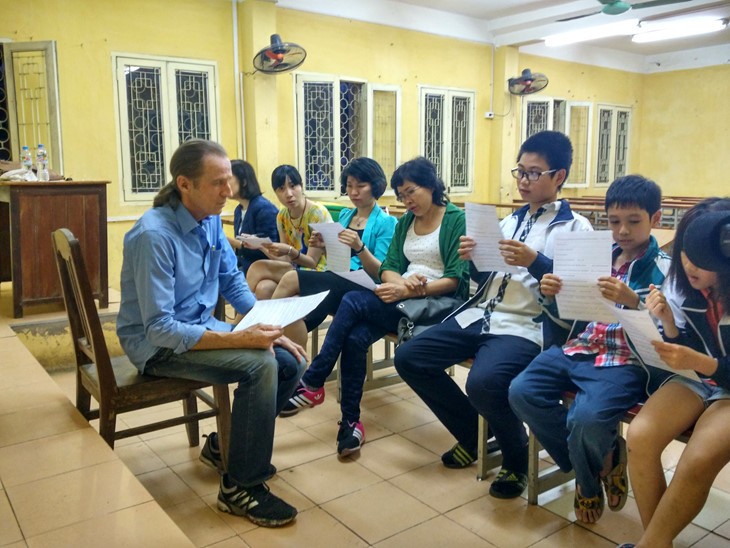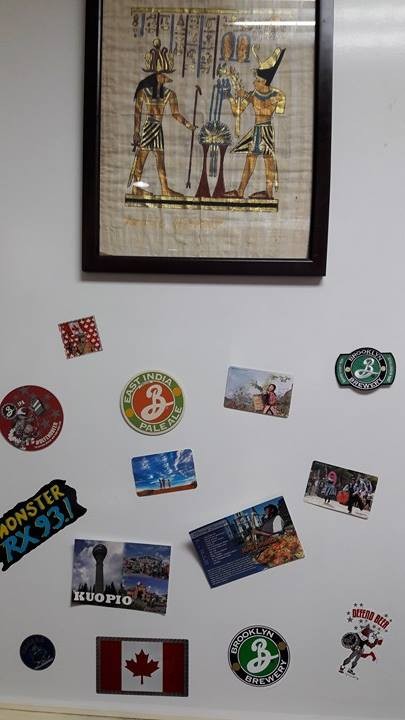Hello and welcome to VOV’s Letter Box, a weekly feature dedicated to our listeners around the world. We are Ngoc Huyen and Mai Phuong
A: This week, as usual, we received several interesting letters and emails from our listeners around the world. These messages encourage us to continue our shortwave broadcasts and improve our website content.
B: In his email this week, Ullmar Qvick of Sweden wrote: “How nice to hear your quoting from my recent report in your Letterbox. I could not listen on the radio last night, due to going to the Red Cross for language training of refugees who want to learn Swedish better. But this morning an e-mail from my friend Lars Wieden informed me about your mentioning me in your broadcast yesterday! You will no doubt hear from me again soon.”
A: Mr. Qvick continued: “I enjoy listening to Vietnamese pop music on YouTube, with fine melodies and videos of sweet, beautiful girls... I do have a question for you: Which are the languages taught at the universities in Vietnam? Are Swedish studies possible in your country? Which is the most popular foreign language?”
B: I don’t think that we have Swedish studies in Vietnam. English is the most popular foreign language being taught at schools at all educational levels. But learning two foreign languages at the same time is getting more popular in Vietnam. English is usually the first one, and is studied along with Japanese, Chinese, Korean, Spanish, French, or Russian.
 An English class of American war veterans in Vietnam An English class of American war veterans in Vietnam
|
A: Here’s an email from Sutomo Huang of Indonesia. He wrote: “The reception of VOV’s English Service is good and steady. I want to know more about overseas Vietnamese people.”
B: There are more than 4.5 million Vietnamese living in other countries around the world. In recent years, an increasing number of overseas Vietnamese have returned to invest in Vietnam and contribute to national development. Investment in Vietnam by overseas Vietnamese has increased in both scope and scale.
A: Many overseas Vietnamese have returned to the homeland to work in education reform, health care, economic restructuring, clean energy, and transportation infrastructure.
B: About 300 overseas Vietnamese experts come back every year. Of those,55% work for state agencies and 45% work in education or for research institutions. The Vietnamese government has specific policies to assist Vietnamese expats and mobilize them to contribute to the homeland.
A: This week, we received a letter from Peter Ng of Malaysia. He reported reception of a VOV broadcast on March 28 on the frequency of 12020 khz and rated SINPO at between 4 and 5. He asked whether VOV has a Vietnamese lesson program.
B: Thank you, Mr. Peter Ng, for tuning in to our broadcast regularly. For overseas broadcasts, we do not have a Vietnamese language lesson program, but if you visit our website and listen to our live-streaming FM programs, you can hear our Vietnamese language lessons, which are broadcast daily in the morning and afternoon. For FM broadcasts in Vietnam, we have both English and Vietnamese lessons available on our website at vovworld.vn. The website has an updated version. Check it out.
A: We hope you will give a listen and send us feedback on the program. We received an email from Gerry Neumann this week. After listening to our broadcast on April 24th, he wrote: “On Monday April24th, reception of VOV here in southern England was as follows: At 16 UTC, on both 7280khz and 9730 khz frequencies, no usable signal reception. At 19 UTC, on 7280 khz, SINPO was 35333, on 9730 khz China Radio International on the same frequency made VOV inaudible.”
B: Thank you, Mr. Neuman, for your detailed reception report. It’s very useful to us. We’ll forward it to our technicians to help them ensure that reception in Europe is clear and sound. We’re happy to hear that you have received our souvenirs. We hope to receive more feedback from you.
A:Grant Skinner of England sent us a reception report for our program on April 8th on the frequency of 7280 khz with SINPO of 35333 and shared with us a story about the meaning of April. He wrote: “Nature and romance have given us the month of April. In the northern hemisphere, it is the time when the buds of flowers and trees begin to open up and blossom. The month has become identified with this delicate stage of natural growth. The word ‘April’ is derived from a Latin expression meaning “I open”.
B: Mr. Skinner also elaborated on another meaning of April. He continued: “On the other hand, recognizing the significant part played by reproductive forces in this month, the Greeks may have dedicated it to Aphrodite, their goddess of fertility, beauty, and life. ‘April’ is perhaps merely a shortened form of her name.”
A: We found your story about the meaning of April quite interesting. Thank you very much for sharing it with us, Mr. Skinner.
 Listeners' corner at VOV's English section Listeners' corner at VOV's English section
|
B: We would like to thank Mr. Roger Roussel for his gift of many stickers of Canada. They are very nice. We’d like to acknowledge his report on programs on April 4th, 5th, and 7th from 00:00 UTC to 00:27 UTC on the frequency of 7315 khz. We’ll send QSL cards to confirm all three reports.
A: We also want to thank Mr. Richard Nowak of the US for his frequent reception reports and the many stickers and other gifts he has sent from the US. They are on our office wall right now.
B: Here’s a letter from John Rutledge of the US, who is living in China right now. He wrote: “Thank you for your broadcasts. I still enjoy them and listen on a regular basis. I’m now back in northeast China and the listening situation is not as good as in southern China. While listening to your station in southern China I usually never hear any noise or interference. In northeast China, unfortunately, it is a common occurrence. I hope this situation will change sometime in the near future.”
A: Thank you, Mr. Rutledge. It’s good to hear from you again. We’ll forward your report to our technicians in order to improve our broadcasts. We’ll send you QSL cards to confirm your reports for the programs on April 2nd, 4th, and 5th on the frequency of 12020 khz.
B: We’d like to acknowledge emails and letters from Sekar Thalainayar of India, Genki Konsai of Japan, and Miss Supriya of India. We’ll send you QSL cards, frequency lists, and program schedules soon.
A: We welcome your feedback at: English Section, VOV World Service, Voice of Vietnam, 45 Ba Trieu Street, Hanoi, Vietnam. Or you can email us at: englishsection@vov.org.vn. Tune in to additional English programs on our website at vovworld.vn. Good bye.